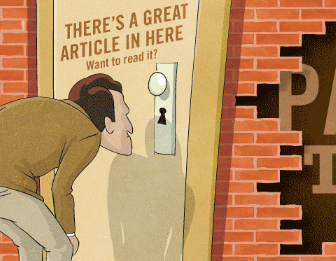So, Elsevier pulled kind of a jerk move. And probably a move that’s not great for PR.
As it turns out, publishing giant Elsevier is taking down copyrighted papers from Academia.edu. Here’s a bit of background. For-profit publishing companies (like Elsevier, Sage, Taylor & Francis etc.) make authors sign a copyright agreement when they publish in the journals run by these companies. This gives distribution rights to the publisher, and takes them away from the author. However, many authors (like myself) sign said agreement, and then immediately post content on Academia.edu, ResearchGate, or other academic-based social networking sites.
Technically, posting our work on these sites is illegal. However, the publishers’ policies, which create false scarcity, exploit intellectual labor, and restrict knowledge sharing, are in a word, preposterous. Here’s why:
First—and this is a moral stance—scholarship should be a public good. These publishers boast that their journals house the most innovative and world-shattering research. This is why the journals are so valuable. And in the same breath, they argue that this information should be restricted from the general public—unless, of course, that public is willing to pay exorbitant fees. If this is our model, then I can’t help but ask, what’s the point? Why bother with the sweat and toil of research if it’s only available to other researchers who will use it to inform their research, which will also be restricted from public view. The academic masturbation analogy is almost too easy.
Second, publishing companies enforce policies as though they still own the means of production, even though they no longer do. Rather, they (for now) own the means of prestige. When academic journals were distributed in print only, the number of pages in a journal, its production, and its distribution, had cost-prohibitive limitations. I do not, for instance, have the infrastructure with which to print my own work and distribute it internationally. The big publishing houses do have this infrastructure, and so, for print-based articles, I am fully dependent on them, as are potential readers. Unsurprisingly, this relationship of dependence results in a model that is most beneficial for the publishers. Here’s what that model looks like:
- Scholar puts in research/writing labor (University pays Author)
- Author submits to journal (Author pays Publishing Company submission fee)
- Scholars review submitted articles for free (nobody pays anybody)
- Editors publish articles and sell them to institutions and individuals (Readers and Universities pay Publisher)
In short, authors and reviewers engage in labor. They are paid indirectly by universities, who also pay publishers. Occasionally, individuals also pay publishers. Perhaps you’ve noticed, the only ones receiving direct payment for research activities are the publishers. Everyone else pays out, especially universities. And who pays universities? That’s right, students and tax payers.
But, ya know, computers and The Internet. Now that research articles have been digitized, the information they contain no longer needs to follow a model of scarcity. Nobody needs to check them out of the library. We can all read all of the articles, at the same time. If you spill coffee on it, you can print another (or more likely, send it to your Kindle).
Moreover, authors can easily distribute their own work without going through these companies. I can distribute this blog, for example, with no personal financial cost, no financial costs for the reader, and quite small institutional costs. Ideas are no longer bound by profit-seeking gate-keepers. Access is no longer restricted to those with proper institutional affiliations. And this is why PJ Rey (@pjrey) argues that academic journals are the dinosaurs of academic publishing, and why David Banks (@DA_Banks) uninstalled Mendeley.
What these companies do maintain, however, is control over the means of prestige. Although this may be slowly changing, committees that decide on hiring, and on tenure and promotion, make many of these decisions based on the prestige of the journals in which a faculty member publishes. The for-profit closed access journals, with high impact factors and itty-bitty acceptance rates, as a rule, hold greater weight. I could cite statistics, but as a fresh-off-the-job-market-PhD, I will instead just say that I was told on multiple occasions, by members of different hiring committees, that my *peer-reviewed* publications weren’t “mainstream” enough. They wanted specific journals, and I wasn’t published in those[1].
In short, it’s not that individuals don’t have the resources to share their own ideas; it’s not even that not-for-profit open access models can’t provide rigorous peer-review or produce innovative and important research (they do). Rather, the incentive structure still privileges a traditional model. This model disproportionately benefits for-profit publishers.
Now, to be fair, Elsevier and others offer “open access options” for authors, and provide select articles as open access, usually for a finite amount of time. The former, however, relies on author payment (which, from my experiences, is a bargain at around $3,000). The latter offers only a glimpse of what’s offered. It’s more of a sample to draw customers in than a good-faith effort to promote public engagement. I see both of these as release valves, doing nothing to accomplish a public-goods model, but alleviating just enough of the pressure.
So quickly, let’s talk about the ways we, as academics, are complicit in perpetuating false scarcity, and the possibilities for resistance.
Quite simply, academics comply with a false-scarcity model every time they submit to, review for, or cite a paywalled article. They/we also perpetuate that model by evaluating job and/or tenure candidates based on metrics which bolster the “big name” journals.
The most obvious form of resistance includes not submitting to, reviewing for, or citing from, paywalled journals. But as usual, reality is more complicated than this. Selective submitting and reviewing is great for well-established scholars. Corner-office holders of the world, please, by all means, pave the way by placing your work exclusively in open access venues. Throw away your assumptions about impact factors and competitive acceptance rates, and hire someone who simply does good and innovative work. However, selective citation is trickier. At what point does a political stance outweigh the goal of good research? Perhaps the most relevant conversations, or germinal pieces, are located behind paywalls.
More personally relevant, what about us noobs? Our names don’t yet pull weight, and moreover, we haven’t yet entered into a lot of the academic discussions (or if we have, those engaged in the discussions probably don’t realize we’re there, quietly waving with hopeful smiles). Based on the above essay, a reader might surmise that I only publish in open-access venues. Well, I don’t. I do when I can, but place my work first and foremost, based on journal relevance (and of course, acceptance by editors and reviewers). Sometimes that means signing a binding legal document which places my work behind a paywall. Ugh.
I do, however, ignore that legal document. I post my work on Academia.edu., share it on Twitter, and give it to anyone who will read it. No one has yet taken down anything I’ve shared, but if they do, I will repost immediately, in as many places as I can. I’m far more willing to suffer legal repercussions than intellectual ones, and I’m not going to sacrifice participation in an academic conversation because a bunch of a-holes refuse to evolve with the changing technological affordances of the time.
————————————————————————————————-
Read all of my articles un-paywalled on my Academia.edu page
Check out a great thread on the Association of Internet Researchers listserv (AIR-L) with regards to the Elsevier-Academia.edu incident: http://listserv.aoir.org/pipermail/air-l-aoir.org/2013-December/subject.html*
*Read everything with Open Access and Elsevier. People wrote/responded under various headings, therefore breaking the thread.
Follow Jenny on Twitter, where she regularly grants access to legally inaccessible stuff: @Jenny_L_Davis
Pics via (in order):
http://affordablehousinginstitute.org/blogs/us/2006/08/upside_down_loo.html
http://www.bestcollegesonline.org/paywalls/
[1] It’s not that I was purposefully trying to publish in less “mainstream” venues, but rather, these venues seemed to best fit my work at the time.



Comments 6
Jill Walker Rettberg — December 14, 2013
I agree with almost everything you write, but wouldn't it make more sense to share copies of all your papers in an institutional archive and/or your own personal website? Academia.edu is a private company that presumably will find ways to make a profit. It's great that academia.edu is getting us more and more used to sharing our research but I'm not convinced it's going to remain open in the long run.
Danny — December 18, 2013
I agree with Jill's comment. Academia.edu basically disintermediates publishers, by getting individuals to do the labour of providing their material and following other individuals in turn. This is all great except Academia makes their money off it, without providing any services to disciplinary communities or even at a banal level to the metrics academics might use to justify their research (one does not yet submit one's academia followers for research evaluation, though this may not be far away). I just don't like the way they attempt to become the default site for content over personal, university or disciplinary repositories. The issue is framed as info-corporates vs the free internet but academia.edu is simply a new info-corporate with seemingly little commitment to scholarly work. From their site "We have raised $6.7 million from a range of investors" - mostly venture capitalists - we will be monetised.... as we are in social media generally which is not a public sphere but a means of aggregating attention for profit.
The Real Victims of Journal Paywalls » Cyborgology — February 10, 2014
[…] of the debate surrounding open access contends that social research should be a “public good,” and therefore openly available. I wholeheartedly agree (in fact, that link above goes to my own […]
Georgia Christinidis — February 20, 2014
Recent developments suggest that coopting academia.edu for our purposes may be difficult. The latest unannounced innovation on academia.edu seems to be that they now only list papers that have actually been uploaded – for instance, I actually listed the details of nine articles on academia but uploaded only three due to copyright restrictions, providing abstracts and/or links to e-journals for the others. Suddenly, only three articles were displayed, the details for the others were nowhere to be found. My talks, which I had listed and entered abstracts for, have also disappeared. I see academia.edu's latest move as part of an increasing trend to directly compete with rather than supplement the offerings of publishers. They're no longer acting as a gateway to those publications by a user published elsewhere. Because they are structured on the basis of personal profiles, that means there is a strong incentive for people who use the platform at all to publish all their research there, as otherwise their profile may end up looking sparse or skewed. Their user base is now six million. While I'm critical of publishers like Elsevier and the extent to which they make a profit not only from research but also from free peer reviewing etc by academics, academia.edu driving out academic publishers would not, in my opinion, be good news. They are, ultimately, a for-profit organisation and they have not, so far, been very transparent on their future business model. It's unlikely to be advertising-based, like facebook. They will most likely charge a subscription and/or sell data. So, we're potentially allowing an organisation to establish a stranglehold over a market without knowing anything about what their business model is going to look like and what it might cost us to use their platform in the future. I find this highly worrying. I am therefore in the process of removing my articles from academia.edu in a move to erode their user base. They keep 'popping back', however, suggesting that getting the information to really be deleted may be similarly difficult to permanently deleting a facebook account.